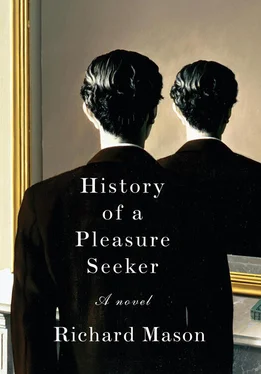He rose and followed the man through a side door.
A large crowd of male passengers was making the same pilgrimage. Though the backstage dressing rooms were formally out of bounds, access to them could be achieved by a discreet tip, and those with permanent mistresses in the chorus had nightly invitations. Piet was borne along with a boisterous crowd of the richest men on earth, which he took as an excellent omen of his own prospects. They reached a steel door and made a show of forcing it. Inside, in their flimsy costumes, gypsies and cigarette girls were smoking and undressing. They feigned horror at being disturbed, but in fact most of the invaders were known to them and welcome, and those who were not hoped to be and were scrupulously charming. After the first intrusion the door opened constantly, admitting flowers and champagne and flush-faced men.
Piet stalked the crowd looking for a blue dress. It was often said of the chorus girls on the Eugénie that they looked as good in person as they did onstage. He passed through them admiringly but was not distracted.
She made him wait twenty minutes. When she entered, she was wearing a wrap of pale pink silk and her dark curls were free of their braids. Both of them were pleased with how the other looked, relieved that the music and the low lights had not caused an embarrassing misjudgment.
He went to her and bowed, raised his eyes to hers and smiled.
“Do say you speak English.”
“I speak English.”
“ Very good. All this French talk makes me so tired.” She went to a rack of clothes, and for a moment he thought she meant to change in front of him. Other girls were undressing; he tried not to see them or to hope that she would. She did not. She took a scarlet dressing gown from a hanger and said, “You might as well get us something to drink.”
There was plenty to drink. They stood beside an open bottle of champagne, delivered to another passenger and forgotten when his lady summoned him.
“Do tell me you aren’t a gigolo.”
“Of course I’m not.”
“It’s just that your clothes are so new and so chic. The effect is marvelous but not authentic.”
Stacey Meadows was wary of too-perfect strangers, though she was also drawn to them. She was now twenty-six. Three years earlier, over tea in a New York hotel during a visit to that city with her mother, she had met a French vicomte with adorable manners. This charming gentleman, just touching fifty, had offered to show them the sights. By the afternoon of their second day together he had roundly banished Stacey’s virginity and left her thrilled with words of love. He had promised to marry her and given persuasive reasons why she should not tell her parents of his intentions; had paid for her passage to Paris and a suite at the Grand Hotel. Three days before her boat docked he had married a Belgian railway heiress. She learned of it soon after her arrival and in a flaming rage took herself to a music hall and got a job and thanked God for sparing her a pregnancy with that man’s child.
Stacey’s voice had been much praised in the front parlors of small but comfortable Chicago houses. It found instant favor in Paris too, and she got a teacher who knew what to make of her gifts. She neither spoke to the vicomte again nor took his money. As she became better known, she felt glad to have been flung so far from her respectable life in the Midwest. She wrote to her parents and told them she was well but did not apologize for running away, and it was only to her brother Fred that she gave a forwarding address. The day she posted this letter she went to an audition at the Opéra Comique and was accepted into the chorus. Barely two seasons later she had a soloist’s part on a highly publicized voyage on a famous ship, with Germaine Lorette in the title role. “So you are well dressed and self-made and you cry during affecting scenes at the opera,” she said. “I do approve.”
“My mother and I sang your duet together. You gave it so well I felt she was speaking to me.”
“You should be scolded, not forgiven. I can quite see that.”
Elsewhere in the room girls were sitting on men’s laps, squealing as their corsets were unlaced. Piet did not wish to seem unsophisticated, and Stacey’s presence after three hours of tantalizing imagining inspired him to follow the example of the other men. He leaned forward and kissed her neck.
The sting in his cheek made him gasp. Stacey rose. It was best to impose discipline from the beginning; otherwise all was chaos. Since the decisive shattering of her illusions she had had no patience with sentimentality, but the vicomte ’s expert induction had left her with a very great liking for clean-smelling men with beautiful lips. Having encountered just such a one, she felt that a little anticipation would make their first embrace infinitely sweeter. She decided to postpone it. “You may call tomorrow after tea to repent. I have a quiet hour while my braids are plaited. We can talk without this mayhem.”
“I’ll do my best to come.”
“I’m sure your best will be enough.”
But the chorus dressing rooms were not accessible from tourist class. “If I don’t come, you must know that I wished to but was detained. May I see you in Cape Town?”
“I will be there as long as the ship.”
“Permit me to look you up, then. What is your name, mademoiselle?”
“Stacey Meadows.”
“I shall find you, Miss Meadows.”
“And I shall let myself be found.”
Observing the exit of Piet Barol, Jay Gruneberger did his best to extricate himself from his conversation with Mrs. Cornelius Schermerhorn. He had unwisely told this lady, who was a passionate amateur botanist, that his wife grew several rare species of bromelia in the hothouses of their estate on the Hudson River. Mrs. Schermerhorn had gone to great lengths to get Bromelia balansae to flower, and never once been successful, and she was halfway through a detailed account of each effort (continued in Jay’s ear throughout Germaine Lorette’s standing ovation) when Piet disappeared. Jay did his best, but the subject was close to Mrs. Schermerhorn’s heart. It was fully three minutes before he could get away.
By the time he had done so, there was no sign of the stranger with the patrician profile. Jay was considerably annoyed. The Eugénie would dock at St. Helena the next day, and his wife would join him, having gone out on Albert Verignan’s yacht a fortnight earlier to oversee the final arrangements. By fashionable standards the Grunebergers’ marriage was a deeply contented one, and Jay felt for Rose a tender affection that would not countenance seductions she might observe. She was the child of his parents’ oldest friends; he had known her since she was six and would not wound her. This meant that his opportunities to follow his own inclinations were limited. When the craving was insuperable he satisfied it hastily and opportunistically, generally in the male lavatories of railway stations and other insalubrious venues. Some of the men he met in these places asked him to pay them, and once or twice he had succumbed to this temptation and emerged from a dingy hotel two hours later, his overcoat pulled over his face, feeling soiled and regretful. For several days he had been imagining a seduction of an altogether more discriminating kind, conducted in the superb comfort of his accommodations on the Eugénie . To have the possibility presented and then snatched away seemed unjust. He went to the landing above the grand staircase, which offered an excellent vantage point.
Once again the lad had vanished.
Though Jay and Rose Gruneberger figured prominently in lists of “New York’s most invited,” and were always described as “popular” and “in demand” by the society press, Jay had no close friends. Twice at Yale he had confided his attraction to his own sex, and both times his confidant’s revulsion had withered their intimacy as surely as salt poured on a snail will kill it. The boys who had fallen in love with him at his New England prep school were now married fathers and when they met made no mention of earlier realities.
Читать дальше












